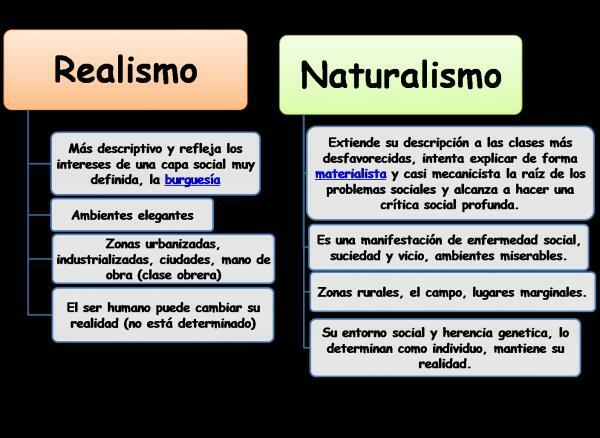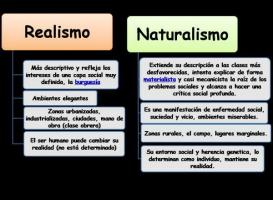The MAIN characteristics of naturalism

Image: Slideshare
In the field of literature and the arts in general, naturalism appeared, a current that drank from realism but that promoted a somewhat different art and with particular characteristics. In this lesson from a TEACHER we are going to discover outstanding characteristics of naturalism, as well as the differences it has with realism. In this way, you will be able to better understand what this current in literature consists of and learn to detect it when you read or watch a work of this style.
We will start talking about naturalism so that you can better understand what this artistic and literary trend consists of. Normally, it is closely related to the realismsince it has some very determining similarities with this movement. Realism was a movement that appeared as a reaction to romanticism: it fled from fantasy to look reality face to face and offer it to the reader in an objective way. Realist literature was intended to become a documentary literature in which the most beautiful aspects of life were reproduced as well as the most vulgar ones.
Emile zola He is considered the father of realism, however, he was highly criticized with the appearance of his novel "Thérèse Raquin" in 1867. Faced with these criticisms, he distanced himself from the realist movement and determined that he was part of another group of writers: the naturalists.
Therefore, naturalism has to be seen as a branch of realism. What they were persistently pursuing was being able to represent reality in an objective and sincere way. They fled from artificiality and avoided reproducing those parts of life that may be more exotic or supernatural. In naturalism they wanted to talk about that part of the world that, almost always, is hidden: racism, misery, corruption, etc.

Image: Slideshare
However, it is very common to confuse realism and naturalism because they have some bases that are very similar. So that you better understand what each concept is, here we are going to offer you a comparison of both worldviews.
The realism he wanted art to flee from the artificialism of romanticism. What i was looking for was show reality objectively and, for this, he used resources such as using the everyday language of the population. The realists observed reality in a very methodical way in order to document everything that happened on a day-to-day basis.
On the other hand the naturalism he wanted to go a step further, which is why many critics consider it to be a more exhaustive type of realism. His methodology was much more scientific and they based their works on some science concepts such as determinism or materialism. They observed and documented daily life but also put their characters in experimental situations to see what might happen in reality.

Image: Differences.eu
Let's go fully into knowing the most outstanding characteristics of naturalism. All these elements will allow you to read a literary work and find out if the current that influences the author is, or not, naturalistic. Here are the most important ones.
Influence of determinism
Determinism is the belief that all people are determined by the situation in which we are born: our sex, our city, our social class, and so on. Therefore, in naturalistic novels there is no free will, the characters are totally conditioned to their origin. The cause-effect relationship is the basis of determinism that prevents characters from actually making their own decisions and living the life they want.
Pessimistic novels
Due to this suffocating condition in which the characters of naturalism find themselves, a pessimistic air is usually breathed throughout the work. One of the characteristics of naturalism is that they wanted to give visibility to aspects that are part of reality and that, since always, had been ignored in the arts and literature. Violence, illness, vice, etc., are some of the themes that we see in these novels.
Objective literature
Due to the desire to reflect reality as truthfully as possible, naturalists used an objective discourse in which the narrator promoted an impersonal tone. He did not get involved in the characters, he simply narrated what happened to them and without putting any phrase or comment that revealed his thoughts. This in part is also influenced by the scientific spirit that naturalists had and that they treated their works as a laboratory in which to test and experiment.
Novels as a laboratory
Another characteristic of naturalism is that they considered the literary text to be their own laboratory. Naturalists investigated society in their own creations. They took advantage of the characters' conditions to try to experiment with them and hypothesize about what their future and destiny would be like. Naturalists considered themselves scientists and their laboratory was literature.
Genetic inheritance
In addition to being influenced by our social context, naturalists also believed that we were influenced by our genes, by our own heritage. The virtues or defects that are passed from generation to generation is something that greatly conditions us and that determines the way we are living in the world.
Against romanticism
Both realism and naturalism arose in reaction to the romantic move. The romantics had opted to carry out a type of art that explored the interior of the human being, emotions, dreams, the subconscious, and so on. A type of literature very isolated from reality and in which the poet became a kind of creator God. Realists and naturalists reacted to this very unreal representation of the world and that is why they promoted another type of art that moved away from fantasy and reflected the world as it is.
Use of science and the scientific method
Naturalists considered themselves scientists of reality. Therefore, they followed a scientific method that sought to analyze life in an objective and real way. Naturalistic writers observed, noted, researched, and then wrote down everything they had seen. In a systematic way and without getting emotionally involved. What they wanted was to analyze reality and to do so they had the novel and the literary field that served as a laboratory for experimentation.
Darwin's influence
And finally, another of the most outstanding characteristics of naturalism is that this movement coincided with the appearance of The origin of species by Charles Darwin which was published in 1859. The scientist relied on evolutionary biology to try to explain where humans come from. Darwin detailed the different evolutions of living beings over the generations and spoke about the natural selection, a concept that indicates that in nature only the strongest or most prepared to win survive. Naturalists conceived of people as species and that all of them were struggling to achieve their own survival.

Image: Slideshare

